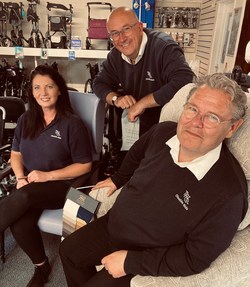Retailer Spotlight: How TPG DisableAids is striving for better
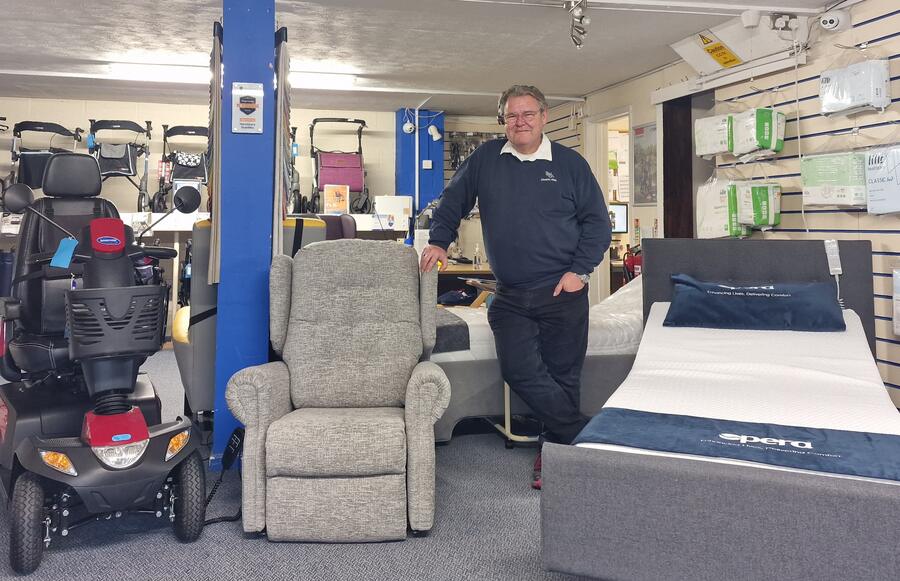
For nearly four decades, family-owned TPG DisableAids has built up an excellent reputation for providing access and mobility solutions in and around Hereford. THIIS caught up with Alastair Gibbs, Managing Director of TPG DisableAids, to find out how the business came to be established, some of the challenges he has faced along the way and about why he is passionate about raising standards in the industry…
Mobility retailer TPG DisableAids has been selling, installing, maintaining and repairing a range of healthcare equipment for the elderly and disabled community for 38 years. It also works with local authorities, housing associations and the NHS.
The Hereford-based business was established in 1985 by Alastair’s dad, who had previously been working in the agricultural industry but was made redundant, after the brand he had been working for was bought out.
“My uncle was one of the founding three partners of Chiltern Medical and they needed a distributor in our part of the country,” explains Alastair. “So, Dad did some research and found that a number of stairlift, hoist and mobility products were underrepresented in our area.
“This led to a life-changing decision to leave agriculture behind and step into the world of disability equipment.” High levels of service and customer care were easily transferable skills, and so this proved to be.
TPG DisableAids was formed using the initial letters of its founders, Tony and Pam Gibbs, beginning at first as a part-time business run from home.
Alastair took over the business when he was 26, after having worked for British Telecom since leaving school. After leaving school to join an apprenticeship scheme, Alastair started out working as a telephone engineer at BT, taking on further education as he rose through the ranks.
He reached a stumbling block though when the Corporate Manager at BT informed him that as he did not have a university degree, he would not be able to progress any further up the management structure.
“This felt like a waste of my potential but was a big leap of faith to leave what was effectively a job for life and to join Dad in a growing, but unproven business,” recalls Alastair.
 Care in the community
Care in the community
The mobility industry proved to be the perfect fit for Alastair, as he had always had a passion for great customer care.
“Working in the maintenance of the local network with BT allowed me to control up to 20 engineers and technicians to deliver a time-sensitive service that exceeded our customer expectations.
“Having the opportunity to bring that experience to a new customer base and be masters of our own destiny, rather than just a very small cog in a massive corporate machine, seemed very logical at the time.”
The move to becoming self-employed in a start-up business was tough at first and involved a lot of hard work. The effort was immense, explains Alastair.
“The idea is that you can work when you like, take time off when you like and reap the rewards of your own efforts. The reality is, of course, nothing like that!”
Alastair found that he was working 70- to 80-hour weeks and being on call seven days a week, but he says: “The satisfaction of actually changing a customer’s life and bringing some normality to their daily living by installing a stairlift or supplying a mobility device does, however, bring far greater reward than money.”
TPG DisableAids hasn’t just stopped at investing in customer care, though. At the height of the COVID-19 pandemic the retailer carried out a number of community-minded initiatives, which included making face masks, staff donating to food banks, offering free wheelchair hire for customers to attend vaccination appointments and donating equipment.
Alastair comments: “I feel that it is important to look out for each other and if you are in a position to help, then you should. It may not always be the best business decision to do so, but life is not black and white. I encourage all staff to ‘do the right thing’ and I lead through example.
“I actually spend quite a bit of time volunteering at the weekends at our local community park and this reflects our core values and the TPG DisableAids tag line of ‘let our family help your family’.”
Higher energy prices and tax rises have inevitably added further challenges to the business, as they have for most retailers. Alastair explains that he has navigated these challenges by investing in commercial property, and it has several tentants who pay rent, which helps smooth the peaks and troughs of trading.
The expectation of higher wage bills and increased business taxation will “inevitably” cause it to raise its prices in the near future, he says.
“It will also mean we will look closely at our customer base and those, such as some housing associations or the NHS, that expect zero inflation alongside net zero carbon targets and so on will need to realise that they are not actually very attractive customers anymore.”
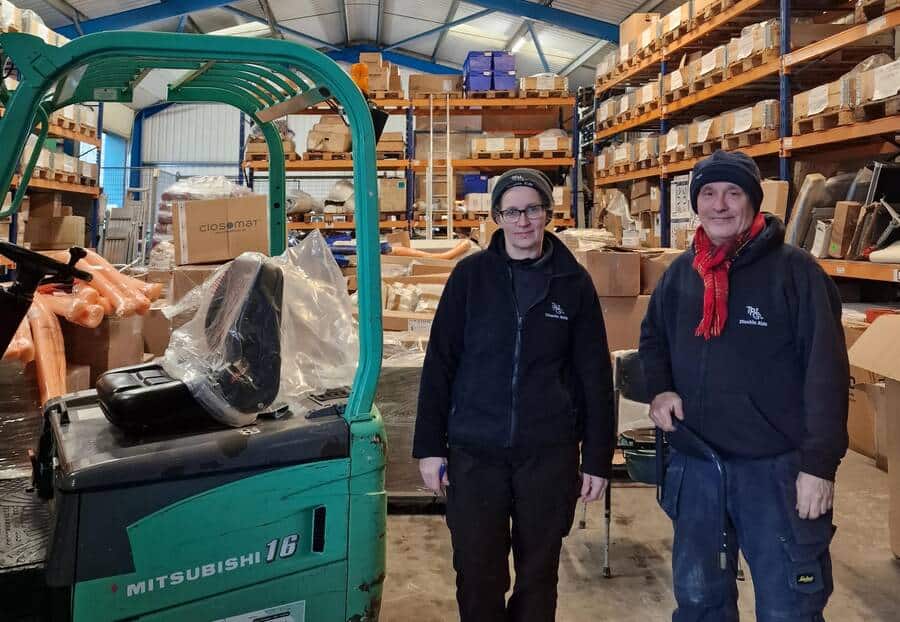
Investing in industry training
TPG DisableAids moved into its current building on Plough Lane around 25 years ago and has evolved in how products are displayed and brought to market.
Its current Head of Sales is Jayme Bacon, who came to the business from the mobile telephone sales industry. Jayme is supported in the showroom by Dave Kelly and Bex Munroe.
Alastair explains: “The aim is to give exceptional service backed up with the correct solution. We often refer to ourselves as ‘solutions providers’ rather than salespeople.
“To that end most of our customer-facing staff in the sales department are trained and qualified to ‘trusted assessor’ standard.”
Some employees have reached the Level Four standard, enabling them us to give qualified advice to homeowners and tenants on suitable adaptations.
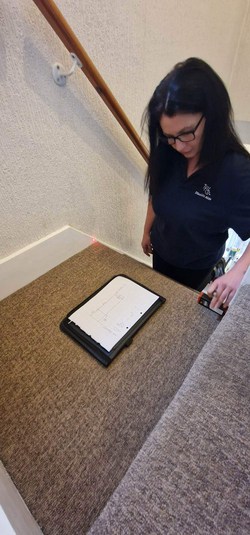
In addition to the showroom staff, the retailer has another four mobile sales assessors out on the road working with customers across the region.
A patient handling training academy was set up in 2019, which has served the business well in helping to introduce many from the healthcare community to TPG DisableAids’ services.
Alastair explains that the academy offers a way to better enable healthcare professionals to demonstrate their knowledge to their customers, who can then make informed choices about the products they need.
“We found that there was a lot of poor practice and fear of patient handling out in the community which made people reluctant to get involved,” explains Alastair.
“To overcome this fear, we felt that care staff should have the opportunity to train and practice with the equipment in a relaxed area away from the service users.”
The facility has been taken up by a number of care agencies, local authorities and nursing homes, giving them access to modern up-to-date equipment that may sometimes be better than the equipment they currently use.
Alastair adds: “The staff would then be requesting better and more suitable equipment from their employers, which of course we are happy to supply!”
The facility is often hired out on a daily basis by private agencies to run their own training courses. The Disabled Living Foundation hires out the venue to run its Trusted Assessor courses, for example.
Alastair comments: “This brings in delegates from the surrounding area which are also made aware of the services we offer with regards to supply, install and maintenance of the equipment.”
The venue is also being used for monthly Women’s Institute meetings, which potentially brings in more awareness of the equipment available for potential customers, who are maybe looking out for a friend or family member.
Lifting standards
After four decades in the business Alastair has certainly seen mobility equipment evolve in huge leaps and bounds over the years.
In the early Eighties, some of the mobility equipment was pretty horrific, says Alastair. “It was big, heavy, and crude. The stairlifts too were heavy mechanical items that had very little ‘design’ involved other than to ensure the function was achieved.”
As the years have rolled by the equipment has improved greatly, he says, but so have the number of players in the marketplace.
“Some products are easy to sell as a box shifting exercise, even though it should be assessed for and adjusted on delivery, which has given rise to the distance selling of many mobility devices.
“This makes it far more difficult to build a mobility business that can add value and service. So, we have increased in areas where we can add value.
“Our stairlift and ceiling track hoist business is certainly something we can specialise in where there is little danger of the customer going off and buying one on the internet and having it delivered to their doorstep in a box for them to self-install.”
With the business selling and installing a lot of stairlifts each year Alastair comments that his relationship with stairlift suppliers is closer than it would be with occasional product lines.
All of its stairlift suppliers are great, says Alastair. “They have all had their own issues over the last couple of years due to component supply or COVID-19-related staffing issues. I think most manufacturers have.”
The one supplier which stands out for him the most though is Handicare, as it has chosen to open up the most.
“They have been receptive to constructive feedback and input for technical R&D issues. We have field trialled solutions and had access to decision makers where necessary.
“They don’t always get things right first time, but that is the real world. As long as we can move forward to be ‘bigger, better and stronger’ [Handicare’s motto] we will be part of that journey.”
Alastair says he looking forward to seeing more improvement in the home lifts section of the market. “Through-floor wheelchair lifts enable the customer to stay in a home they love, and may even have grown up in, but the design has not changed for many years.
“However, 2023 looks like it may well have some new offerings that mechanically and aesthetically raise the bar in terms of integration and move from a disability product to a ‘lifestyle’ product that becomes almost a desirable addition to the home.”
The need for industry regulation
Customers buying items off the internet is an emotive subject for Alastair, as he frequently encounters customers who call in about products they have either purchased online or from another inferior distributor.
“Our solution is simple,” says Alastair. “We will deal with the problem if we can, but all of our time is chargeable. “Any warranty the customer thinks they may have is not with us, it is with the supplier. If we can resolve the problem, they will have learned a valuable lesson, that buying online is not necessarily cheaper.
“If we cannot resolve the issue, they will still have learned that lesson, but will have a bigger invoice to remind them. Either way they tend to be more wary of buying online in future and often become long term customers.”
This is where some regulation in the industry is required, Alastair states. “A product that needs to be assessed for its size and suitability (a medical device) should not be offered online unless that assessment is offered with it.
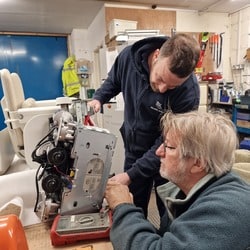
“The handover needs to take place by a trained person who can make those adjustments, not a van driver dropping off a package. There is no issue with small, non-prescriptive products being sold online and drop shipped by a carrier, but anything more complex is always going to be an issue, even if you ignore the pain and discomfort caused.”
As the mobility industry has evolved and matured over the years and its market size has increased, Alastair believes that there is no better time for some form of regulation.
It would, he says, give the buying public some form of reference as a starting point when the need for mobility equipment is required.
As it is, an industry with no regulation leaves it open to malpractice and rogue traders, remarks Alastair.
“There can be significant attraction to sell to the vulnerable and old age market for those that just sell and run.
“It is a constant source of frustration to those of us that choose to run a business properly and train our staff, providing engineering back-up and delivering the best customer experience.
“The BHTA may be a good starting point, but that is only voluntary. If suppliers choose to employ hard sell tactics or offer shady deals on the internet, as long as they do not break the law, they can get away with it. It is only when the product fails that Mr Google is nowhere to be found!”
Alastair explains that there are no plans to add further showrooms, as it already serves five surrounding counties with its current one.
Within this geographic area it is comfortable with, not just selling products but covering the maintenance and breakdowns in a timely fashion, seven days a week.
He adds: “To travel further simply to sell more products but then fail when it comes to aftercare is really not in our best interests. We still do not have 100 per cent of the business in the area in which we trade, to travel outside of this makes very little sense.”
Long-term, Alastair plans put all employees at the heart of any decisions he makes.
He concludes: “I want to ensure the reliability and dependability of the business so that staff and their families can rely upon it. They can make their own plans, take out mortgages, have families, and just feel safe that they are not standing on rocky ground and that TPG will be there to support them.
“We are now in our 38th year of trading so I think we can safely say that plan has worked well so far. The future may look and feel very different to the past but quality and good value will always have a place.”




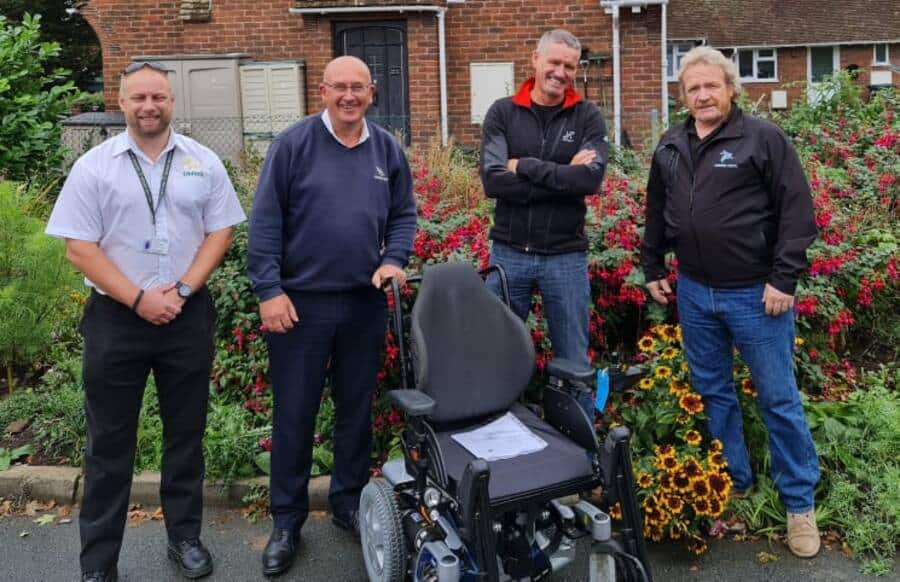 Care in the community
Care in the community